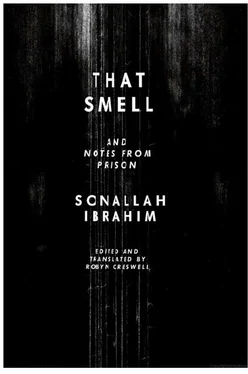Sonallah Ibrahim - That Smell and Notes From Prison
Здесь есть возможность читать онлайн «Sonallah Ibrahim - That Smell and Notes From Prison» весь текст электронной книги совершенно бесплатно (целиком полную версию без сокращений). В некоторых случаях можно слушать аудио, скачать через торрент в формате fb2 и присутствует краткое содержание. Год выпуска: 2013, Издательство: New Directions, Жанр: Современная проза, на английском языке. Описание произведения, (предисловие) а так же отзывы посетителей доступны на портале библиотеки ЛибКат.
- Название:That Smell and Notes From Prison
- Автор:
- Издательство:New Directions
- Жанр:
- Год:2013
- ISBN:нет данных
- Рейтинг книги:4 / 5. Голосов: 1
-
Избранное:Добавить в избранное
- Отзывы:
-
Ваша оценка:
- 80
- 1
- 2
- 3
- 4
- 5
That Smell and Notes From Prison: краткое содержание, описание и аннотация
Предлагаем к чтению аннотацию, описание, краткое содержание или предисловие (зависит от того, что написал сам автор книги «That Smell and Notes From Prison»). Если вы не нашли необходимую информацию о книге — напишите в комментариях, мы постараемся отыскать её.
Notes from Prison
That Smell and Notes From Prison — читать онлайн бесплатно полную книгу (весь текст) целиком
Ниже представлен текст книги, разбитый по страницам. Система сохранения места последней прочитанной страницы, позволяет с удобством читать онлайн бесплатно книгу «That Smell and Notes From Prison», без необходимости каждый раз заново искать на чём Вы остановились. Поставьте закладку, и сможете в любой момент перейти на страницу, на которой закончили чтение.
Интервал:
Закладка:
Sonallah Ibrahim
That Smell and Notes From Prison
TRANSLATOR’S INTRODUCTION
Sonallah Ibrahim’s first book, That Smell , was published in Cairo in 1966. The print run was quickly confiscated, though not before a few copies were passed on to local critics, who were almost as unwelcoming as the censors. Yahya Haqqi, one of the grand old men of Egyptian letters and one of Ibrahim’s early mentors, wrote that he was “nauseated” by the novel, lamenting “its lack of sensibility, its lowness, its vulgarity.” Illegal and abbreviated editions subsequently appeared in Egypt and abroad, but it was only in 1986 that a complete edition was published in Cairo. By that time, Ibrahim had become an established novelist and That Smell was recognized, especially by young writers, as a watershed in Arabic literature — a work of sly sophistication and prescient critique, a fiction to frighten the status quo.
It is not obvious, especially to foreign readers at a distance of almost fifty years, why this short work provoked such a violent response. The reaction of the authorities, which Ibrahim recounts with exasperated amusement in his introduction to the 1986 edition (translated here as an afterword), focused on the novel’s representation of sexual matters. But these scenes, which are brief and rather chaste, do not explain such hostility. In fact, there is little in the story that strikes one as explicitly subversive. It begins with an unnamed narrator being released from prison, followed by scenes of his visits to family and friends while re-familiarizing himself with Cairo, his native city. At night he signs a register of house arrest brought to his door by a policeman. The human setting, as with much of Ibrahim’s fiction, is lower-middle-class: government clerks, newspapermen, low-ranking army officers. There is not much plot in the conventional sense and the narrator’s tone is remarkably blank. He makes no attempt to set his story within a larger historical context, nor does he pass judgment on the things he sees and hears. The story’s central drama, such as it is, revolves around his sporadic attempts to write, though what he is trying to compose is never clear (a novel, a poem, a letter?). Even in this case, not much happens. Confronted by an empty page, he usually ends up smoking or masturbating or spying on his neighbors rather than writing.
That Smell is essentially a roman à clef. When he wrote the novel in his late twenties, Ibrahim himself had just been released from prison. He was arrested for political conspiracy in 1959, along with most other Egyptian Communists, during a round-up ordered by the president, Gamal Abdel Nasser, who had came to power in a military coup in 1952. Ibrahim was given a seven-year sentence of hard labor and ended up serving five, most of them in al-Wahat prison camp in Egypt’s Western Desert. Conditions in the jail were harsh. Prisoners were tortured, several were beaten to death. The narrator of That Smell has also been a political prisoner, though this is implied rather than stated. In one of the opening scenes, he spends the night in a holding pen before being released back onto the streets (another autobiographical detail). A fellow inmate asks what he is in for — drugs? robbery? counterfeiting? — only to be met with a series of denials. Here, as elsewhere in the novel, politics is what cannot be mentioned, or what no one will talk about except indirectly. This unspoken taboo extends to the narrator, who never gives his opinion about life under the military regime, or its treatment of political opponents. Ibrahim’s writing style is a kind of corollary to this. It is a style defined by all the things it leaves out: metaphors, adjectives, authorial commentary. His narrator has the impassivity of a trauma victim: he sees and hears and reports, but makes no claim to understand. This minimalism shocked contemporary Arabic readers. Many found Ibrahim’s style more disquieting than the story’s themes or content. Even now it is not easy to see how he arrived at this way of writing, which breaks so violently with the norms of literary Arabic.
Ibrahim’s experience as a Communist is central to his novel. One might even understand his later career as a writer as an attempt to remain faithful to the history of that movement, long after the Egyptian party ceased to exist. In an autobiographical essay about his years as a militant, Ibrahim claims that when he became a Communist in 1954 it was in part for literary reasons. As a young reader, he had a passion for policiers and historical swashbucklers — Robin Hood, The Three Musketeers, Captain Blood, and the stories of Arsène Lupin. (Traces of this passion for the pulps are still evident in the overheated fantasies of That Smell , as well as the appearance of the radio show, “The Shadow,” in the closing sequence.) By the time he was seventeen, Ibrahim was involved in clandestine political work for Haditu, an acronym for the Democratic Movement for National Liberation, one faction in Egypt’s patchwork of Marxist movements. “There is no doubt,” Ibrahim writes, “that my commitment to clandestine activities stemmed from the adventure stories I loved so much,” stories that had also taught him the virtues of “sincerity, loyalty, self-sacrifice, asceticism, and chivalry.”
The ups and downs of the Egyptian Communist party are notoriously difficult to track. This volatility is partly due to factionalism and partly to the movement’s shifting attitudes toward President Nasser. The party was always small and there were almost as many intellectuals as workers. When the first cells and study groups were founded in the 1930s, the party was mostly led by well-to-do Egyptian Jews. These were committed internationalists and anti-fascists, wary of the chauvinism they perceived in Egypt’s Islamist and nationalist parties. (The early prominence of Jews in many Arab Communist parties would compromise recruitment efforts, especially after the establishment of Israel in 1948.) The Communists initially welcomed the coup of 1952, which put an end to the monarchy of Farouk and, soon after, the British occupation of Egypt. But the honeymoon was short. Twenty days after seizing power, the ruling clique violently suppressed a strike by textile workers and executed two labor leaders. Among the leftists, rumors began to circulate that the CIA had had a role in the takeover. The next four years were characterized by tensions between the Communists and Nasser, as well as between different factions within the movement, whose activists disagreed over whether or not to support the new regime. When Ibrahim joined Haditu in 1954, it was among those factions that enthusiastically backed the officers.
In the aftermath of the Suez War of 1956, having faced down Britain, France, and Israel, Nasser was at the height of his powers. He was a popular leader in the movements for anti-colonialism and pan-Arabism, and he soon emerged, along with Tito and Nehru, as a driving force in the Non-Aligned Movement. Egyptian Communists had little choice except to get behind him. But the regime never returned these friendly feelings. In 1958, a coup by Iraqi officers seemed to signal that country’s turn toward communism and away from pan-Arabism, and Nasser began to worry about his domestic reds. This was the proximate cause for the arrests of 1959, in which Ibrahim was caught up. The consistent support his faction had given Nasser ended up counting for nothing.
One irony of this story is that it was during the years of Ibrahim’s imprisonment, in the early 1960s, that Egypt turned decisively toward the Soviet Union in foreign policy and toward socialism on the domestic front, with ambitious programs of nationalizations and land reform.
Читать дальшеИнтервал:
Закладка:
Похожие книги на «That Smell and Notes From Prison»
Представляем Вашему вниманию похожие книги на «That Smell and Notes From Prison» списком для выбора. Мы отобрали схожую по названию и смыслу литературу в надежде предоставить читателям больше вариантов отыскать новые, интересные, ещё непрочитанные произведения.
Обсуждение, отзывы о книге «That Smell and Notes From Prison» и просто собственные мнения читателей. Оставьте ваши комментарии, напишите, что Вы думаете о произведении, его смысле или главных героях. Укажите что конкретно понравилось, а что нет, и почему Вы так считаете.












